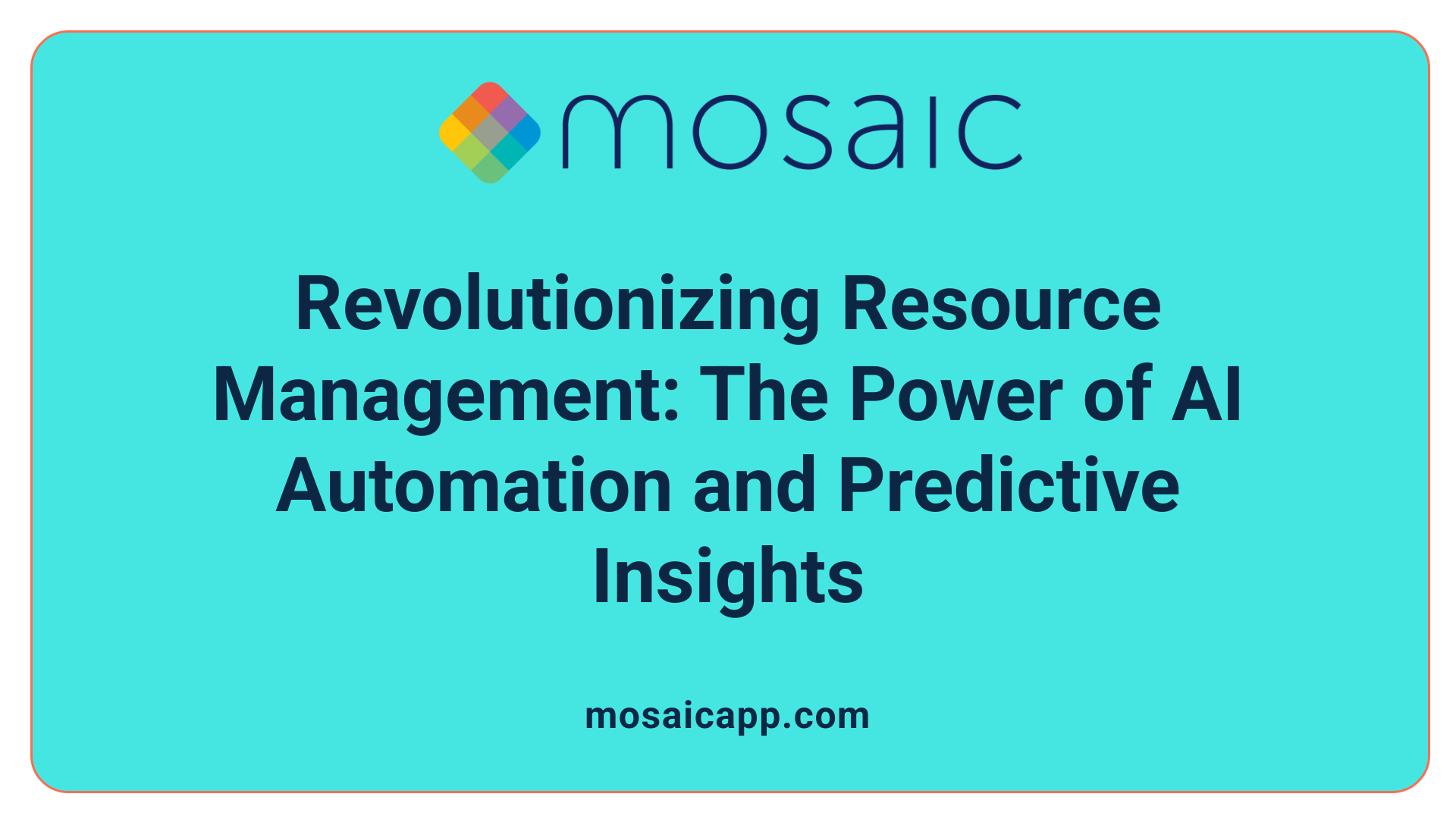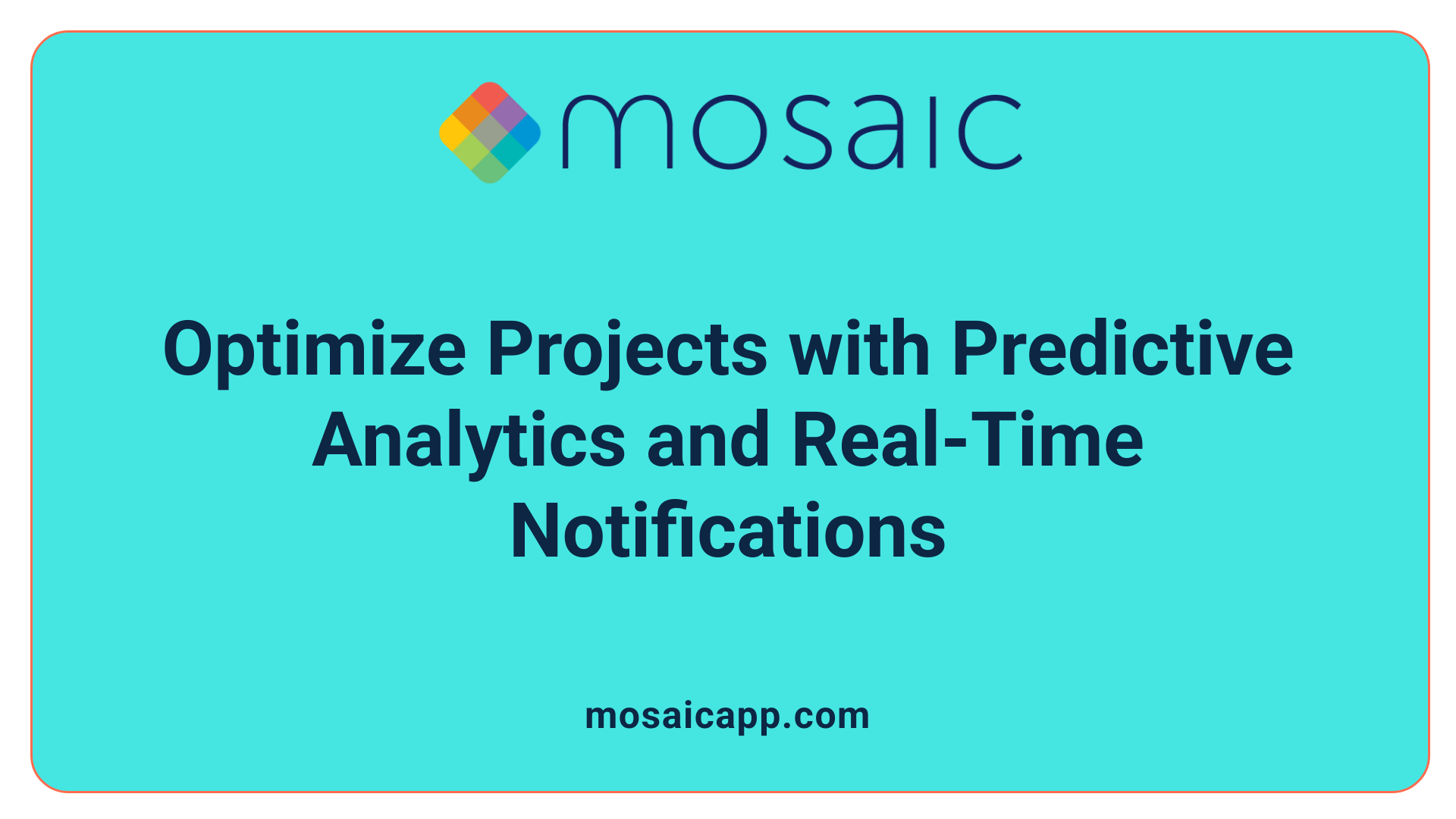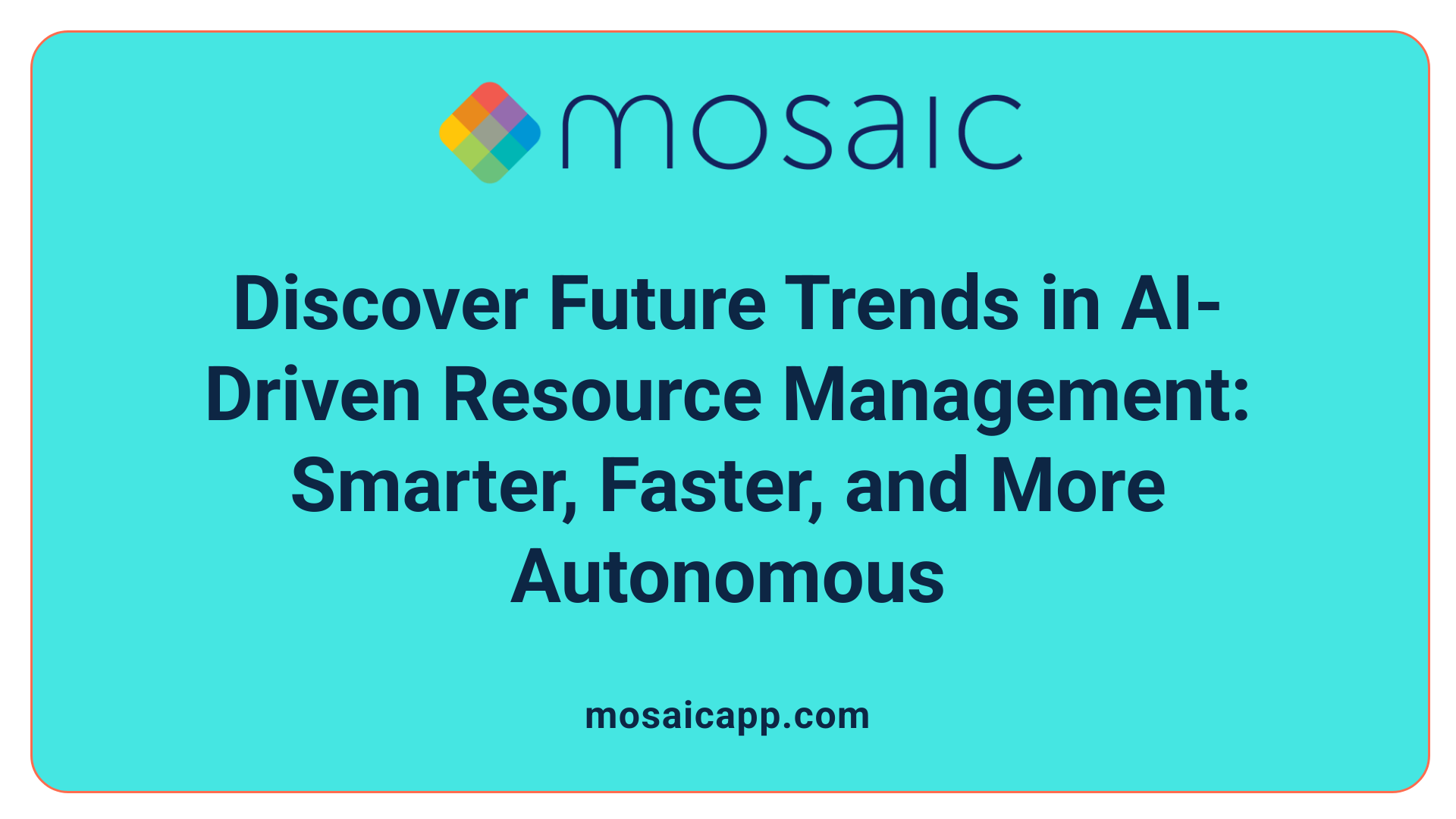Entering the Age of Smarter Resource Management
The integration of artificial intelligence (AI) into resource management software is heralding a transformative era characterized by enhanced automation, predictive insights, and smarter decision-making. Companies across industries are leveraging AI-driven tools to boost efficiency, optimize resource utilization, and achieve faster project delivery, thus redefining how enterprises operate in an increasingly competitive landscape.
Epicflow: Pioneering AI in Project and Resource Management
What makes Epicflow's features stand out?
Epicflow is recognized as the world’s first project and resource management platform to incorporate machine learning and predictive analytics at its core. Its innovative features include an AI resource planning tool called the Future Load Graph, which helps balance workloads by predicting future resource demands. The system offers competence management to optimize task assignments based on skill sets, along with task prioritization to ensure critical activities are addressed promptly.
One of Epicflow’s standout features is its capability to simulate project scenarios through what-if analysis. This enables project managers to evaluate potential impacts of changes before implementing them. Additionally, real-time notifications and updates are delivered via Epica, their AI virtual assistant, which keeps teams informed and responsive.
How does Epicflow use machine learning and predictive analytics?
The platform employs AI to analyze various project parameters such as capacity utilization, project health, and overall performance. It forecasts resource demand, helping teams anticipate bottlenecks and address issues proactively. Epicflow also predicts project deadlines, allowing for early adjustments like shifting start dates if needed.
Furthermore, its predictive models examine past projects to provide tailored recommendations, learn from successful strategies, and improve future planning accuracy. By utilizing these insights, organizations can enhance project delivery times and efficiency.
Which industries benefit from Epicflow?
Epicflow’s flexible architecture makes it applicable across a wide range of sectors. Industries like aerospace, defense, pharmaceuticals, automotive, manufacturing, telecommunications, and software development utilize its features to handle complex project portfolios.
The software’s ability to integrate with existing project management tools further broadens its appeal, enabling seamless adoption without overhauling current systems. Its tailored applications help organizations improve resource allocation, project performance, and strategic planning.
Practical examples of AI in resource allocation and talent management
AI plays a transformative role in talent and resource allocation. For example, AI-driven talent matching platforms analyze employees’ skills, experience, and performance to recommend optimal assignments. This ensures the right skills are deployed to the right projects, enhancing productivity.
Predictive workload balancing uses AI to forecast future project demands, allowing HR and project managers to plan staffing efficiently. Automated staffing recommendations help fill skill gaps, support internal mobility, and facilitate reskilling initiatives.
AI tools also help identify underutilized talent and potential skill shortages, guiding strategic hiring and development. Personalized employee engagement platforms promote continuous learning and career growth opportunities, making workforce management more dynamic and responsive.
Common industry applications of AI-driven resource management tools
Across industries, AI tools streamline operations and support better decision-making. In manufacturing, they enable predictive maintenance—preventing downtime by anticipating equipment failures.
Healthcare providers use AI to enhance diagnostics, personalize treatment plans, and monitor patient health remotely. The financial industry relies on AI for risk management, fraud detection, and claims automation.
Retail and e-commerce platforms leverage AI for inventory optimization, personalized marketing, and customer service enhancements. Transportation and logistics companies utilize AI for route planning and supply chain management.
Public sector entities employ AI for citizen service optimization, resource allocation, and policy simulation, demonstrating the technology’s vast potential.
| Industry Sector | AI Application Examples | Benefits |
|---|---|---|
| Manufacturing | Predictive maintenance, quality control | Reduce downtime, improve quality |
| Healthcare | Diagnostics, remote monitoring | Improve patient outcomes |
| Finance | Fraud detection, risk assessment | Reduce fraud, better underwriting |
| Retail/E-commerce | Inventory management, personalized recommendations | Increase sales, customer satisfaction |
| Transportation | Route optimization, supply chain planning | Lower costs, faster delivery |
| Public Sector | Citizen services, resource planning | Increased efficiency, transparency |
In conclusion, AI-powered project and resource management solutions like Epicflow fundamentally reshape how organizations plan, execute, and optimize their operations. By incorporating predictive analytics and machine learning, they provide actionable insights, automate routine tasks, and facilitate smarter decision-making across industries.
Transformative Capabilities of AI in Resource Management Software

How is AI transforming resource management software?
AI is revolutionizing resource management tools by bringing automation, predictive analytics, and real-time monitoring into the core of operations. It enables software to analyze extensive data sets across industries like manufacturing, aerospace, and energy, forecasting resource needs with high accuracy. AI automates complex scheduling tasks, continuously monitors resource utilization, and detects issues such as bottlenecks or underused assets.
One major development is predictive capacity planning, where AI algorithms assess current workloads and historical trends to project future demands. This helps organizations allocate resources more effectively, scale operations proactively, and prevent delays.
Moreover, AI-powered virtual assistants provide instant notifications and recommendations, facilitating faster decision-making. When integrated with existing systems, these tools can adjust schedules dynamically or reassign tasks to optimize efficiency.
A notable advancement is the move towards explainable AI, which ensures that decision processes are transparent. This transparency builds trust among stakeholders and helps teams understand the rationale behind recommendations.
Overall, AI-driven resource management fosters smarter, data-based decisions. It reduces waste, improves productivity, and supports agile planning, ultimately enhancing operational resilience and strategic growth.
| Feature | Functionality | Benefit |
|---|---|---|
| Automation | Schedule and allocate resources automatically | Time savings, accuracy |
| Real-time analytics | Continuous monitoring and alerts | Rapid response to issues |
| Predictive analytics | Forecast future demand and capacity | Better planning and risk management |
| Bottleneck detection | Identify and resolve inefficiencies | Improved throughput |
| Dynamic reallocation | Adjust resources on the fly | Increased flexibility |
AI-Powered Features Elevating Resource and Project Planning
 Epicflow stands out as an innovative project and resource management tool that leverages artificial intelligence to transform how organizations plan, allocate, and manage their resources.
Epicflow stands out as an innovative project and resource management tool that leverages artificial intelligence to transform how organizations plan, allocate, and manage their resources.
One of its core functionalities includes workload balancing through the Future Load Graph, which visualizes team capacity and helps distribute tasks more evenly. This ensures that resources are not overburdened, enhancing overall productivity.
Competence management is another vital feature, enabling the software to assess team members’ skills and assign tasks accordingly. This results in more efficient task completion and helps in identifying skill gaps for targeted training or hiring.
The platform offers scenario and change simulations, allowing project managers to perform "what-if" analyses. These simulations evaluate the impact of potential project modifications, helping teams make informed decisions and adapt quickly to changes.
Epicflow also incorporates real-time notifications and an AI virtual assistant named Epica. This assistant provides instant updates, reminders, and alerts about project statuses, deadlines, and resource issues, ensuring that teams stay informed and responsive.
Typical Features of AI-Driven Resource Management Solutions
AI-powered tools generally include automated, intelligent scheduling that considers project priorities, deadlines, dependencies, and team availability. Predictive analytics are used to forecast capacity needs, detect project risks, and identify bottlenecks before they cause delays. These solutions offer real-time visibility into resource utilization, helping managers make quick adjustments and prevent overallocation.
Scenario planning tools, like "what-if" analyses, enable organizations to simulate changes and anticipate their effects, leading to more resilient project execution. Alerts and notifications proactively inform teams about potential issues, reducing manual monitoring efforts.
Benefits of AI Integration in Resource and Project Planning
Incorporating AI provides greater accuracy in predicting future resource demands and project outcomes. It optimizes the allocation process by matching skills and availability with task requirements, resulting in improved efficiency.
AI reduces human bias and errors, promotes fairness, and supports dynamic, real-time adjustments to plans. Automation of routine tasks frees managers to focus on strategic decision-making.
Moreover, predictive analytics enhances risk management, helping teams foresee problems and implement solutions early. Overall, AI-driven planning speeds up decision processes, boosts project success rates, and provides a competitive edge in fast-paced industries.
| Feature | Description | Benefits |
|---|---|---|
| Workload Balancing | Visual tools like Future Load Graph | Prevents burnout, improves productivity |
| Competence Management | Skill assessments, task matching | Enhances task quality, identifies gaps |
| Scenario Simulations | "What-if" analyses | Better decision-making, risk reduction |
| Real-Time Alerts | Notifications via AI assistant | Increased responsiveness |
Practical Impacts of AI on Business and Operational Efficiency
How does AI improve automation and workflow optimization?
AI transforms the way businesses operate by automating routine and complex tasks. For example, Epicflow uses machine learning to predict resource demand, balance workloads with tools like the Future Load Graph, and alert teams about potential bottlenecks. This automation reduces manual effort, accelerates project timelines, and minimizes human errors.
Furthermore, AI-driven virtual assistants like Epica provide real-time notifications and support, allowing teams to respond swiftly to project changes. In public accounting, AI optimizes staffing and scheduling in real time, ensuring resources are effectively allocated according to project needs.
This integration of AI leads to streamlined workflows, enhanced productivity, and a significant reduction in operational delays.
What is the impact of AI on business efficiency, decision-making, and operational effectiveness?
AI greatly enhances overall business efficiency by automating repetitive processes and optimizing resource use. Predictive analytics, such as those employed by Epicflow and Forecast, analyze vast amounts of data to forecast future demand, project deadlines, and potential challenges. This enables companies to plan better, make informed decisions, and respond proactively.
By examining historical data, AI tools can recommend better task prioritization, align skills with project needs, and identify underutilized resources, boosting operational effectiveness. For industries like aerospace, defense, and manufacturing, this results in faster project deliveries and increased output, as evidenced by case studies showing a 200% increase in output and a 50% reduction in lead times.
In addition, AI supports smarter automation inERP systems, allowing businesses to perform virtual tasks, analyze data deeply, and enhance performance across functions. The combined effect of these innovations results in more agile, responsive, and competitive operations.
How do AI-powered tools support operational enhancements?
AI tools facilitate continuous operational improvements through features such as real-time data insights, virtual project management assistance, and simulation of project changes. Platforms like Forecast and Epicflow enable scenario testing to see how adjustments impact project timelines and resource loads.
AI’s ability to analyze data in real time fosters quicker reaction to project variances. It enables companies to mitigate risks early, optimize capacity, and improve delivery times.
Moreover, AI enhances customer experience and internal efficiency by enabling smarter process automation, better decision-making, and personalized interactions. Companies integrating AI into their workflows often see faster, more accurate decisions that improve overall productivity and profitability.
Industry-wide adoption and future advancements
Major ERP providers including Oracle, SAP, and Microsoft are now embedding AI functionalities such as predictive analytics, natural language processing, and automation into their systems. Future trends point toward more explainable AI, hyperautomation, and industry-specific AI solutions—advancing operational efficiencies further.
By 2025, widespread adoption of these technologies is expected to revolutionize industries by making systems more intelligent and adaptable, ultimately leading to more efficient, innovative, and competitive business models.
Future Trends and Innovations in AI-Driven Resource Management
 Recent innovations in AI technology tailored for resource management and professional services have significantly advanced how organizations optimize their operations. Modern systems now leverage sophisticated machine learning models and natural language processing integrated into enterprise platforms like ERP and project management tools. These enhancements enable smarter automation, real-time analytics, and more informed decision-making.
Recent innovations in AI technology tailored for resource management and professional services have significantly advanced how organizations optimize their operations. Modern systems now leverage sophisticated machine learning models and natural language processing integrated into enterprise platforms like ERP and project management tools. These enhancements enable smarter automation, real-time analytics, and more informed decision-making.
Platforms such as Epicflow exemplify these innovations by utilizing AI for capacity utilization, project and performance analysis, and risk prediction. These capabilities allow companies to forecast resource demands accurately, adjust workflows dynamically, and automate complex scheduling tasks. Virtual assistants like Epica offer proactive notifications, while scenario-based planning and scenario simulations help teams prepare for project shifts, ultimately improving productivity and reducing errors.
The evolution of ERP and resource management systems is closely tied to AI integration. Major vendors, including SAP, Oracle, and Microsoft, are embedding AI features like predictive analytics, virtual assistants, and autonomous decision-making into their solutions. For instance, AI-powered ERP systems facilitate real-time monitoring, predictive maintenance, and autonomous decisions in production and supply chain management, delivering notable gains in efficiency and agility.
Collaborative efforts—such as SAP partnering with NVIDIA and Microsoft integrating with OpenAI—are driving innovations that expand AI functionality in business systems. The future points toward widespread use of explainable AI for transparency, hyperautomation for comprehensive process digitization, and industry-specific AI applications that cater to unique operational needs. As these trends evolve, enterprise resource planning will become increasingly autonomous, data-driven, and capable of supporting smarter, faster business decisions across diverse industries.
Embracing the AI Revolution in Resource Management
As artificial intelligence continues to evolve and integrate comprehensively into resource management systems, organizations across sectors are poised to benefit from unprecedented efficiencies, smarter decision-making, and more agile operations. The future landscape will be characterized by explainable AI, hyperautomation, and industry-specific solutions that promise to reshape enterprise resource planning and project management at their core. Embracing these innovations now will set the foundation for sustained competitive advantage and operational excellence in the AI-driven era.
References
- AI-Driven Resource Management Software Solution
- AI in ERP: The Next Wave of Intelligent ERP Systems
- Revolutionizing Resource Management with AI
- AI Powered Resource Management Software
- Understanding AI in resource management
- AI in ERP: Benefits, Examples & Challenges
- Artificial Intelligence in ERP
- AI in ERP: The Next Wave of Intelligent ERP Systems
